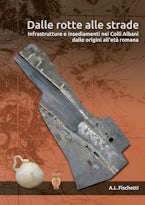Thirteen papers on Roman archaeology from the 10th TRAC conference in London. The tenth Theoretical Roman Archaeology Conference was held in April 2000, at the Institute of Archaeology. As the conference was divided into five different sessions. In the opening session, Representing Romans the methodology of portraying the Romans to the wider world was explored. Hunter and Clarke's paper outline the challenge of designing appropriate gallery displays for the new National Museum of Scotland whereas Grew, discusses the development of Roman London. Fincham's paper discusses the threat of overwhelming military intervention by the imperial owner in colonial negotiations. Issues of ethnicity, gender, class and occupation within the later Roman army are addressed here. Green's paper presents an important discussion of the nature of human/stag hybrids in iron Age and Gallo-Roman iconography and Hawkes presents an analysis of differential foodways, preparing and serving meals encountered in Roman Britain. Carr considers the role of body decoration and grooming, arguing that individuals in different areas of south eastern Roman Britain made different cultural choices to structure their ethnic identities. The final set of papers focused on Constructing Childhood in the Roman World reconsidering some long-standing truisms regarding the status and treatment of children in the Roman context. Pearce's examines Roman infant burial and what role religion plays in burial ceremony.
Representing the Romans in the Museum of Scotland (David Clarke and Fraser Hunter)
Representing Londinium (Francis Grew)
Writing colonial conflict, acknowledging colonial weaknesses (Garrick Fincham)
Identities in the late Roman army: material and textual perspectives (Andrew Gardner)
Medicine, culture and military identity (Patricia Baker)
Siege works, psychology and symbolism (Gwyn Davies)
Animal iconographies: metaphor, meaning and identity (Miranda Aldhouse Green)
An archaeology of food: a case study from Roman Britain (Gillian Hawkes)
Small finds: problems and possibilities (Kelly Spradley)
`Romanisation' and the body (Gilly Carr)
Infants, cemeteries and communities in the Roman provinces (John Pearce)
Unpicking a myth: the infanticide of female and disabled infants in antiquity (Eleanor Scott)
Playing Dead (Rebecca Gowland)











